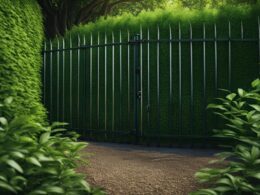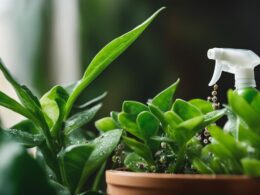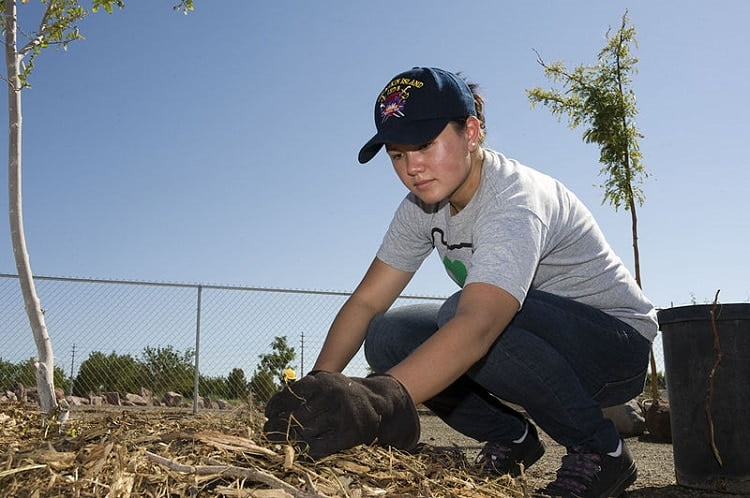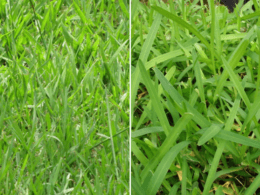Are you struggling to grow healthy plants in your garden? The pH level of your soil could be the culprit. Maintaining the right pH level is crucial for plant growth, and some plants require acidic soil to thrive.
But don’t worry, there are simple tips and additives that can help you acidify your soil and create the perfect environment for your plants to flourish. In this article, we will guide you through the importance of pH for plant growth and the scale of pH measurement.
We will also discuss various additives that can be used to lower the pH of your soil, so you can choose the best option for your garden. With our tips and guidance, you will be able to create a healthy environment for your plants and watch them grow strong and beautiful.
Quick Summary
- Testing pH regularly is crucial for proper nutrient absorption and healthy plant growth.
- Different plants thrive in different pH levels, so it’s important to know the pH requirements of the plants you are growing.
- Organic matter like compost and sphagnum peat can naturally lower pH over time, but certain additives like sulfur and fertilizers can also be used to quickly acidify soil.
- When choosing an additive, consider effectiveness, cost-effectiveness, and potential long-term impacts on soil and plants.
Importance of pH
You know that the pH level is crucial for healthy plant growth. Most garden plants thrive in a pH range of 6.0-7.5, but some plants, such as blueberries and azaleas, require acidic soil.
The pH level measures how acidic or alkaline the soil is, with a scale ranging from 0 to 14. A pH of 7 is considered neutral, while a pH below 7 is acidic and above 7 is alkaline.
To ensure your plants receive the proper nutrients, it’s essential to test the pH level regularly. You can use pH measurement tools to check the pH level of your soil and water quality.
By understanding the pH level, you can determine which additives to use to lower or raise the pH level to achieve optimal plant growth. Remember, it’s crucial to maintain the right pH level for your plants to thrive and produce a bountiful harvest.
What are Safe Disposal Methods for Acidic Soil Additives in Mindful Gardening?
When practicing mindful gardening, it’s essential to know safe fertilizer disposal tips for acidic soil additives. Instead of throwing them in the trash or pouring them down the drain, consider various eco-friendly options. Composting is an effective method to neutralize these additives, turning them into nutrient-rich soil. Another safe approach is to contact local recycling centers or hazardous waste facilities for proper disposal guidance. Stay mindful of the environment while nurturing your garden.
Testing and Additives
Consider purchasing a soil pH testing kit or seeking professional testing to determine the current pH levels before deciding on which additive to use. Knowing the current pH of your soil is important because different plants thrive in different pH levels. Testing the soil also helps you avoid adding too much of an additive, which can harm your plants.
When choosing an additive to lower soil pH, consider the effectiveness and cost-effectiveness of each option. Organic matter like compost and sphagnum peat can lower pH over time, while sulfur is safe and inexpensive but slow-acting. Aluminum or iron sulfate can quickly lower pH, but it may be detrimental to some plants. Fertilizers containing diammonium phosphate and ammonium nitrate can also lower pH.
Keep in mind that soil with pH levels over 7.5 may contain high amounts of free calcium carbonate, which makes it difficult to change pH. By testing and choosing the right additive, you can create an optimal environment for your plants to thrive.
Is Acidic Soil Necessary for Growing Plants in Sand?
Yes, acidic soil is necessary for growing plants in sand. The low pH of acidic soil helps in releasing essential nutrients like iron, manganese, and aluminum that are often lacking in sand. Without the acidic soil, the plants may struggle to thrive in the harsh environment of growing plants in sand.
Considerations and Costs
When thinking about the pH levels in your garden, it’s important to keep in mind the potential costs and benefits of different methods for lowering pH.
While some additives may be more effective at quickly lowering pH, they may also have a negative long-term impact on your soil and plants. Consider the needs of your garden and the cost-effectiveness of each option before making a decision.
For example, aluminum or iron sulfate can quickly lower pH, but they may also harm your plants in the long run. On the other hand, organic matter like compost and sphagnum peat can lower pH over time without causing damage to your soil or plants.
Additionally, while sulfur is a safe and inexpensive option, it is slow-acting and may take several months to see results. Keep these factors in mind when choosing the best pH-lowering additive for your garden.
Frequently Asked Questions
Can soil pH affect the color of flowers in plants?
Did you know that the acidity of your soil can affect the color of your flowers? The pH level of your soil can impact the pigmentation of your plants and even hinder pollination. Keep your soil balanced for healthy, vibrant blooms.
Is it possible to make soil too acidic for plants to grow?
Preventing soil acidification is important, as making soil too acidic can hinder nutrient uptake and harm plants. Always conduct a soil test before adding acidic additives and monitor pH levels regularly to avoid making soil too acidic.
Can adding too much sulfur to soil be harmful to plants?
Adding too much sulfur to soil can lead to sulfur toxicity, which can harm plants. It is important to follow soil amendment ratios and conduct a soil test to ensure the correct amount of sulfur is added for optimal plant growth.
Are there any natural ways to raise soil pH?
You can use eggshells and organic matter like compost to increase soil pH. Fresh coffee grounds are acidic, but used ones are neutral. Vinegar and lemon juice can lower pH, but effect may not be long-lasting.
How often should soil pH be tested for optimal plant growth?
For optimal plant growth, test soil pH every 2-3 years. Testing methods include DIY kits or professional testing. Regular testing ensures plants receive optimal nutrients and additives can be used if pH levels are off.









